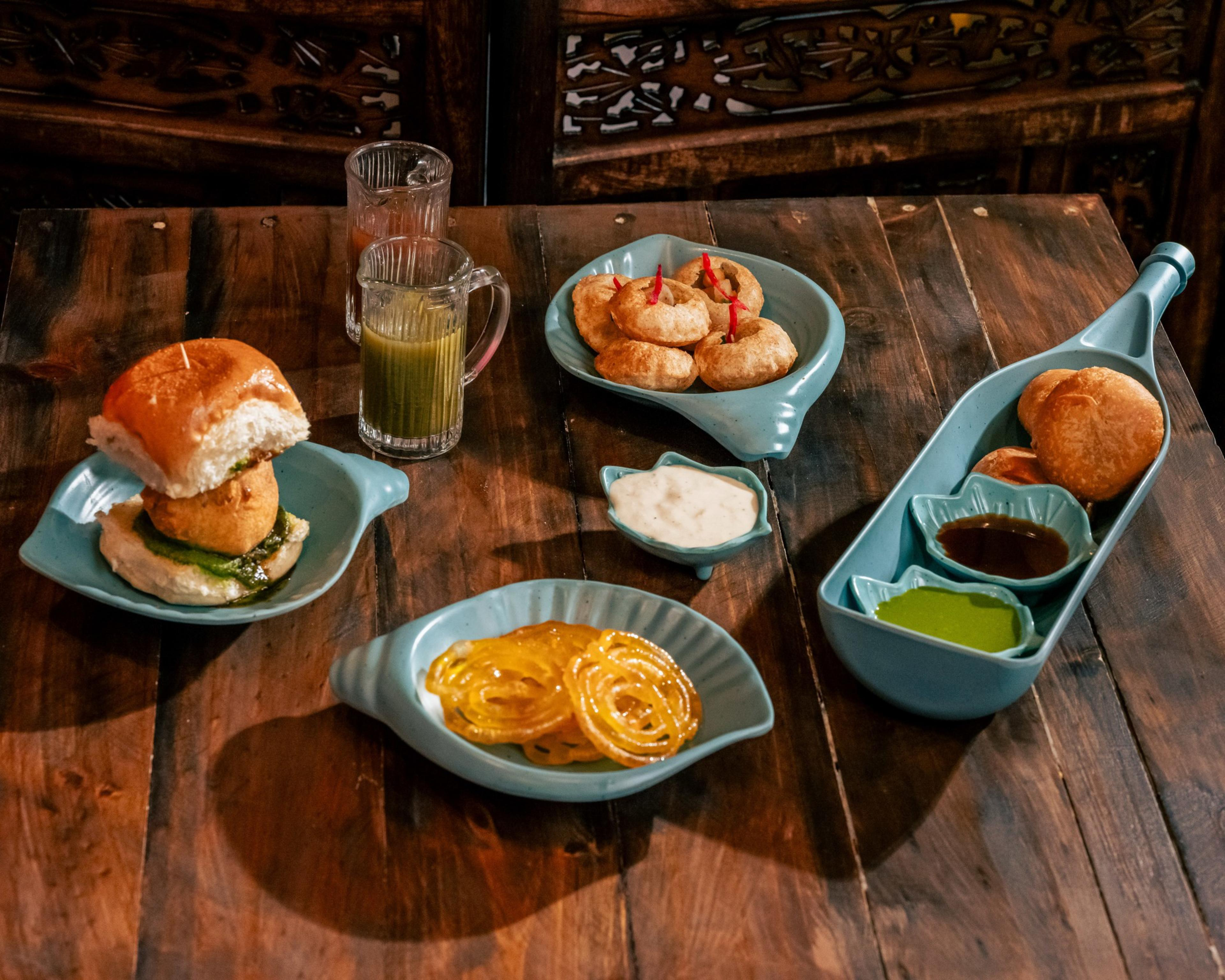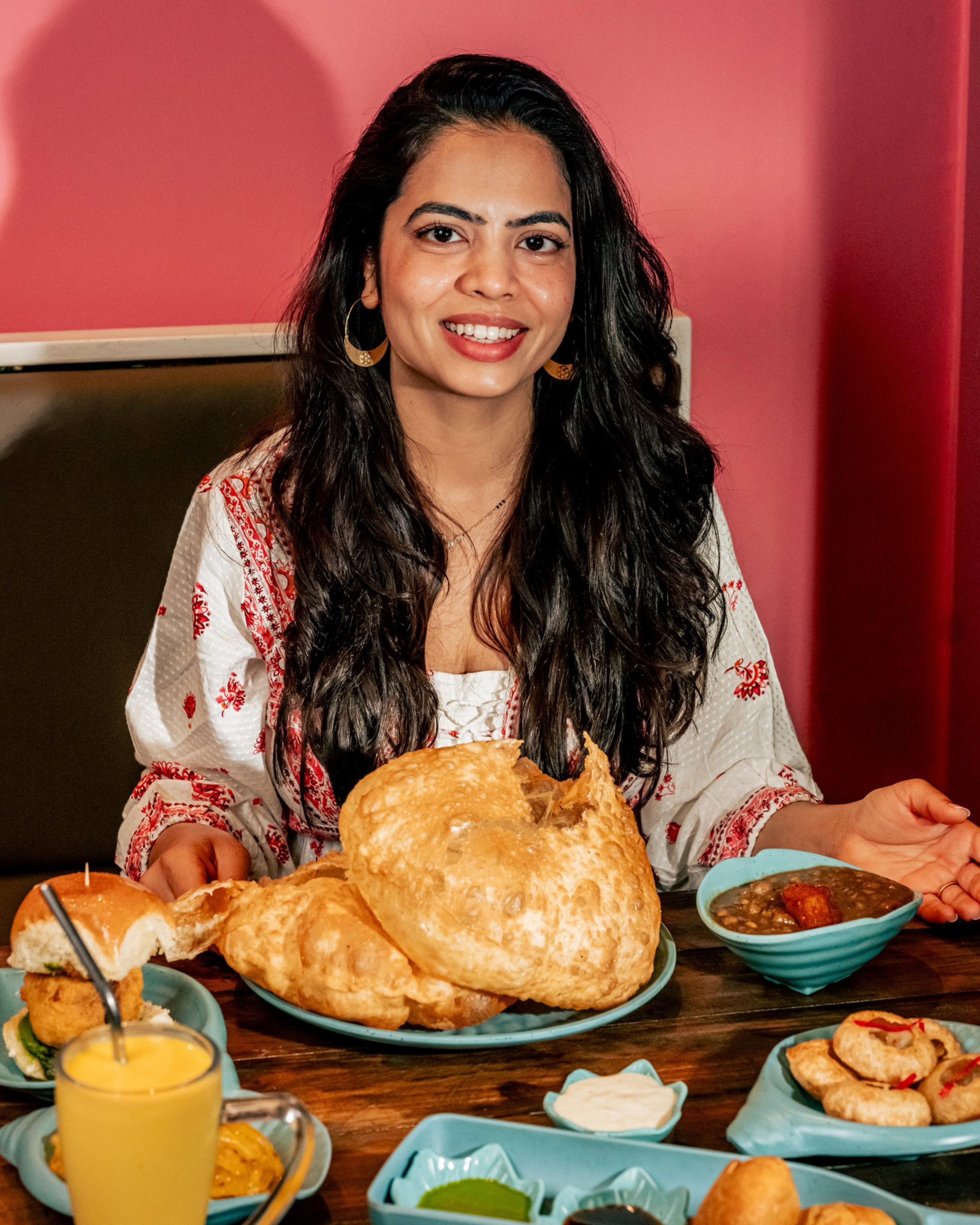Eat Here Now is a first look at some of the newest, hottest restaurants around — the ones we think are worth visiting. We dine once, serve forth our thoughts, and let you take it from there.
If you ask my two food-obsessed friends who grew up in North India, Jalebi Street — a new mom-and-pop restaurant in the upper Haight — makes the best chaat within a 15-mile radius.
Yes, this means Jalebi Street is even better than the beloved West Berkeley institution Viks Chaat. Fighting words for sure, which is why my friends requested to be kept anonymous. But they aren’t wrong: Jalebi Street’s take on chaat, the sweet-savory (mostly) fried street food snack that originated in North India, is among the best you’ll find anywhere near San Francisco.

The menu also includes other street foods and mains like dal makhani ($16), a rich, time-consuming dish made of slow-cooked black lentils, and saag paneer ($17) topped with a pat of butter. But, at this point, in our chaat-desert of a city, the chaat is what's getting the buzz.
Jalebi Street’s owners, husband and wife Sam Bhamu and Bhawana Choudhary, opened the restaurant in March, moving it to the city after launching in 2021 as a pop-up in a parking lot in Sunnyvale. “But you can’t do a lot of things in a parking lot,” Choudhary says. They initially made plans to get a food truck but then stumbled on a prime location in the Haight. “It was a shocker when we got it. We were like, ‘Oh, shit — now what are we going to do?”
When I stopped in for lunch in July, the restaurant had yet to hire a dishwasher, so paper plates were being used, which added to the street food vibe. (A dishwasher was being hired and real plates were on the way.) The interior is rather bare bones — decorations are also coming — which is fine, because you’re not here for the atmosphere. You’re here to eat until you ache.

Choudhary, who studied cooking and worked in hotels in India, moved here from Rajasthan last year after marrying Bhamu. His parents own a Indian restaurant in Sunnyvale called Bikaner Sweets. Their wedding was a “set up,” as Choudhary puts it, arranged in part because of the couple’s shared love of food and certainly because both spent their childhoods in Delhi. Bhamu’s brother Vikram Bhamu, a tightlipped cook who won’t share his secrets, is Jalebi Street’s chef.
My friends and I started with the chaat side of the menu, including pani puri ($9), five light-as-air, crisp shells served with mint and tamarind chutneys. They are more fun to eat if you know how to do it properly. My friend demonstrated, spooning in a little of the sweet tamarind chutney and then — using the hollow shell as a ladle — using her fingers to dip the whole thing into the mint chutney, the tart-sweet liquid dripping everywhere. (Laughing, her husband said that in India, “The taste of the pani puri is the taste of the sweat of the guy making it on the street.” Luckily, San Francisco has remained at a very unsweaty 65 degrees all summer.)
Up next was the onion kachori ($12), three savory pastries with interiors lined with a thin layer of sweet, aromatic caramelized onions and spices. (The chef will not divulge the spices, not even to Choudhary.) Kachori is a Rajasthan specialty that requires a patient 40-minute fry, a demonstration of deftness if a chef can keep the outside crispy and inside soft without burning it, which he did.
“People travel so far for these,” says Choudary. My friends took a bite and deemed the flaky kachori “great.” We also ordered the kachori chaat ($12) topped with tamarind and mint chutneys, then smothered in tart, cold yogurt and a sprinkling of little fried noodley bits called sev.
From the non-chaat street food options, there’s vada pav ($5.50) — called vada pao on the menu — one of Bombay’s most iconic street foodsand my discerning friend’s all-time favorite. At Jalebi Street, however, the massive starch-on-starch sando, a huge spicy fried potato fritter on a soft bun, is deemed “Delhi style” (to which my friend sniffed, “Delhi-style vada pao doesn’t exist”) because it's served with a swipe of sweet tamarind chutney — apparent blasphemy. Though some customers love it, Choudhary knows she’s serving a bite of something divisive. “It’s always the debate,” she admits.

Better yet — and devastatingly delicious — was the chole bhature ($16), a balloon of a blistered, chewy-crispy fried bread pulled apart to release a puff of steam, ready to swipe in a bowl of spiced chickpeas that are darkened by the addition of black tea. Our choice for runner-up was the Rajasthani bedmi poori allo sabji ($15), four smaller, slightly denser, fried and puffed whole-wheat breads served with a comforting spiced potato curry. (My friends’ parents were the first to visit Jalebi Street and loved this dish enough to request that an order be brought home to them.)

And finally, there was the piece de resistance: Jalebi ($8), a sweet made to order from fermented batter that’s fried by piping it directly into ghee, after which it’s soaked in saffron sugar syrup. Considering jalebi is the restaurant’s namesake, there’s a lot of pressure for it to perform.
I’d never had jalebi before, but what arrived — a delicate, golden, transparent, shattering spiral that, with one bite, flooded my mouth with a syrupy-saffrony, eye-popping sweetness — could be a Michelin-level dessert if it just had fancy plating. We ordered it with rabri, a mild, house-made condensed milk scented with lemony cardamom. It’s the perfect foil, providing equilibrium to the heady sugar rush. One bite and my friend was sold: “Best jalebi I’ve had in the country."

